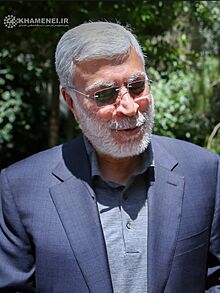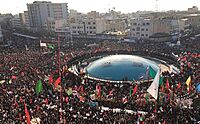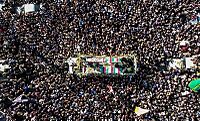Abu Mahdi al-Muhandis facts for kids
Quick facts for kids
Abu Mahdi al-Muhandis
|
|
|---|---|
|
أبو مهدي المهندس
|
|

Abu Mahdi al-Muhandis
|
|
| Deputy Chairman of Popular Mobilization Committee |
|
| In office 15 June 2014 – 3 January 2020 |
|
| Secretary-General of Kata'ib Hezbollah | |
| In office October 2003 – 3 January 2020 |
|
| Succeeded by | Ahmad al-Hamidawi |
| Member of Iraqi Parliament | |
| In office 2006–2007 |
|
| Personal details | |
| Born |
Jamal Ja'far Muhd. Ali Al Ibrahim
16 November 1954 Abu Al-Khaseeb, Basra Governorate, Kingdom of Iraq |
| Died | 3 January 2020 (aged 65) Baghdad Airport Road, Baghdad International Airport, Baghdad Governorate, Iraq |
| Cause of death | Assassination |
| Political party | Islamic Dawa Party (1977–2020) |
| Other political affiliations |
Islamic Supreme Council of Iraq (1985–2020) |
| Committees | Axis of Resistance |
| Military service | |
| Allegiance | |
| Branch/service | Popular Mobilization Forces |
| Years of service | 1979–2020 |
| Rank | Commander |
| Unit | Kata'ib Hezbollah Badr Brigade (formerly) |
| Battles/wars |
|
Jamal Ja'far Muhammad Ali Al Ibrahim (born November 16, 1954 – died January 3, 2020) was an important Iraqi military leader. He was better known by his nickname, Abu Mahdi al-Muhandis. This name means "Father of Mahdi, the Engineer".
At the time of his death, he was the deputy chief of the Popular Mobilization Forces (PMF). This group is a collection of different militias in Iraq. He was seen as one of the most powerful people in Iraq.
Abu Mahdi al-Muhandis was against the government of Saddam Hussein starting in 1977. He later became a commander of volunteer groups that formed to fight against ISIS. He also worked with Iran's Islamic Revolutionary Guard Corps against Saddam's government.
Contents
Who Was Abu Mahdi al-Muhandis?
Abu Mahdi al-Muhandis was a key figure in Iraq's recent history. He played a big role in fighting against different groups and governments. He was known for his military leadership and his strong beliefs.
Early Life and Education
Abu Mahdi al-Muhandis was born Jamal Ja'far Muhammad Ali Al Ibrahim on November 16, 1954. His birthplace was Abu Al-Khaseeb District in Basra Governorate, Iraq. His father was Iraqi, and his mother was Iranian.
He studied engineering and finished his studies in 1977. In the same year, he joined the Islamic Dawa Party. This political group was against the ruling Ba'athist government in Iraq.
Military Career and Activities
In 1979, the Dawa Party was banned by Saddam Hussein's government. Many people who opposed the government were sentenced to death. Because of this, Al-Muhandis left Iraq and went to Ahvaz in Iran.
In Iran, he was known as Jamal al-Ibrahimi. He even became an Iranian citizen after getting married there. He started working with Iran's Revolutionary Guard in 1983. He helped organize actions against embassies in Kuwait that supported Saddam during the Iran–Iraq War.
Return to Iraq
After the 2003 invasion of Iraq led by the U.S., Al-Muhandis returned to Iraq. He worked as an adviser for security to the first Iraqi prime minister after the invasion. He was also elected to the Iraqi Parliament in 2005.
Later, he had to leave Iraq again and went back to Iran. He then helped create a group called Kata'ib Hezbollah between 2003 and 2007. After U.S. troops left Iraq in 2011, he returned to lead Kata'ib Hezbollah. He then became the deputy chief of the Popular Mobilization Forces.
Fighting ISIS
In 2014, the Popular Mobilization Forces (PMF) were formed. This group was created to help Iraq fight against ISIS. Abu Mahdi al-Muhandis was chosen to command this important group.
The PMF included about 40 different militias. They fought in almost every major battle against ISIS. Al-Muhandis played a big part in leading these forces to defeat ISIS.
His Death
Abu Mahdi al-Muhandis was killed on January 3, 2020. This happened around 1:00 AM local time. He was killed by a U.S. drone strike near Baghdad International Airport. The same strike also killed Qasem Soleimani, a top Iranian military leader. Many news organizations called this event an assassination.
Funeral and Legacy
On January 4, a large funeral procession was held in Baghdad for Abu Mahdi al-Muhandis and Qasem Soleimani. Thousands of people attended, carrying Iraqi and militia flags. The procession started at the Al-Kadhimiya Mosque.
Leaders from Iraq and Iran-backed militias were present. Funeral prayers were also held in the holy Shia cities of Najaf and Karbala. His body was later taken to Iran for a DNA test.
Another funeral procession took place in Iran, starting in Ahvaz. On January 6, Iran's Supreme Leader, Ali Khamenei, led funeral prayers in Tehran. Hundreds of thousands of people attended.
On January 7, his body was returned to Iraq and taken to his hometown of Basra. He was buried on January 8 in Najaf, Iraq. Many mourners gathered to say their final goodbyes.
A year after his death, on January 3, 2021, tens of thousands of Iraqis marched in Baghdad. They remembered Abu Mahdi al-Muhandis and Qasem Soleimani.



See also
 In Spanish: Abu Mahdi al-Muhandis para niños
In Spanish: Abu Mahdi al-Muhandis para niños
- Abu Mahdi (missile)
- List of assassinations by the United States
- USA kill or capture strategy in Iraq
 | Sharif Bey |
 | Hale Woodruff |
 | Richmond Barthé |
 | Purvis Young |

